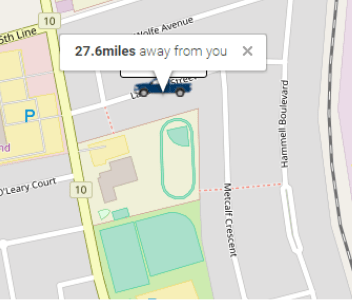Why Fleet Vehicle Tracking is Important for Your Business
Fleet vehicle tracking is important because it squashes problems and lets fleets run smoothly. Here are some common pain areas that tracking systems resolved.
Common Pain Areas Solved by Fleet Vehicle Tracking
“What the heck are my drivers doing?”
Pain area: Accountability, customer service.
One of the biggest issues for fleets is supervising drivers. Here are some examples of dishonest drivers:
- Some drivers were caught taking leisure rides in company vehicles and on company time. Instead of serving customers, they drove to other places – ranging from their home to local hangouts.
- Other drivers were caught using vehicles for personal business. For example, a snow plow business caught a driver that used the company vehicle to take side jobs.
All of these issues were solved when vehicles were tracked. Besides rooting out dishonest employees, location tracking is also used for customer service.
For businesses that need to update customers on their service, real-time location tracking is an easy way to get and share info. Some businesses even took it a step further and uploaded the tracking data to a customer accessible web portable.
“Don’t tell me we got in another accident!”
Pain area: Safety, liability.
Running a fleet of vehicles can be risky. Some companies were held legally liable for accidents. For example, a trucking company owner was jailed because he encouraged unsafe driving practices. Other companies lost thousands of money from traffic tickets, fuel wastage, and lawsuits.
A great way to reduce safety risks is to use fleet vehicle tracking to actively train drivers. Fleets were able to create and enforce rules, from classic speeding rules to more advanced driving habits.
For example, one company required all drivers to back into parking spots because reverse parking is safer than head-in parking. They created a reverse parking rule. With vehicle tracking, the fleet created and monitored parking reports. As a result, the company got their entire fleet to buy into the parking policy and significantly decreased parking lot accidents.
“How am I spending this much money on fuel?”
Pain area: Operation cost
Fuel is a huge operating cost. It hasn’t helped out that fuel prices have spiked over the past year. The most effective adaptors, however, came from companies who tracked and monitored fuel use.
For example, a common idea to save fuel is controlling idling. A lot of fleets have a no-idling policy and need a way to enforce the policy. Enter fleet tracking! With vehicle tracking programs, fleets were able to set idling limits and work with drivers that exceeded those limits.
Another idea is creating smart routes. For companies that answer multiple daily service calls, a challenge is to figure out what is the most efficient way organize the driver’s day. Route planners calculate the order of the route, the directions of the route, and how long to spend on sites. As a result, fleets took on more jobs throughout the day.
Summary
Fleets have a lot of pain areas to deal with. Driver accountability. Safety. Fuel costs. The list goes on. Fleet vehicle tracking is valuable to fleets because it gives fleet managers a tool to create solutions for these pain areas.
Links
Sault Star: Judge hands transport owner 6 months jail
Geotab: Why Reverse Parking is Safer





